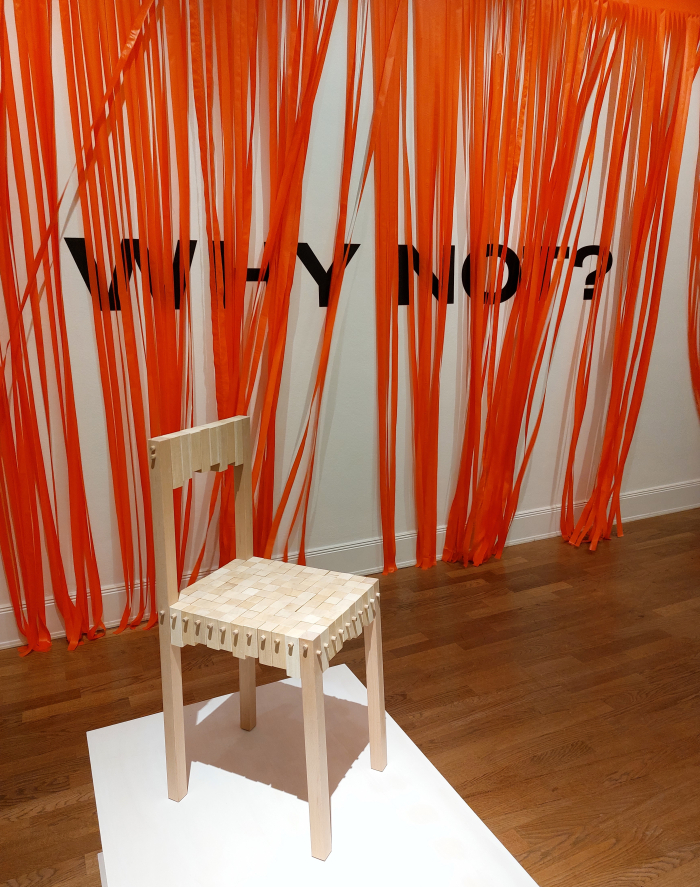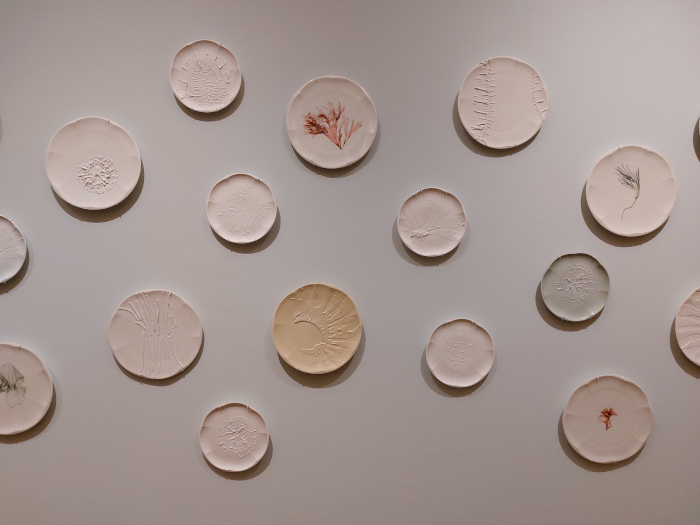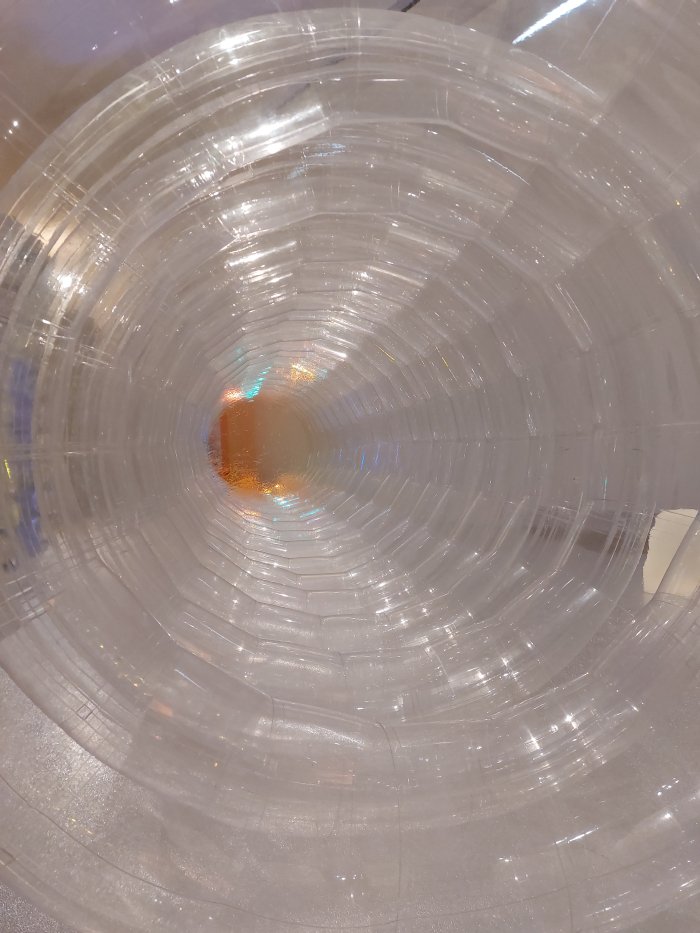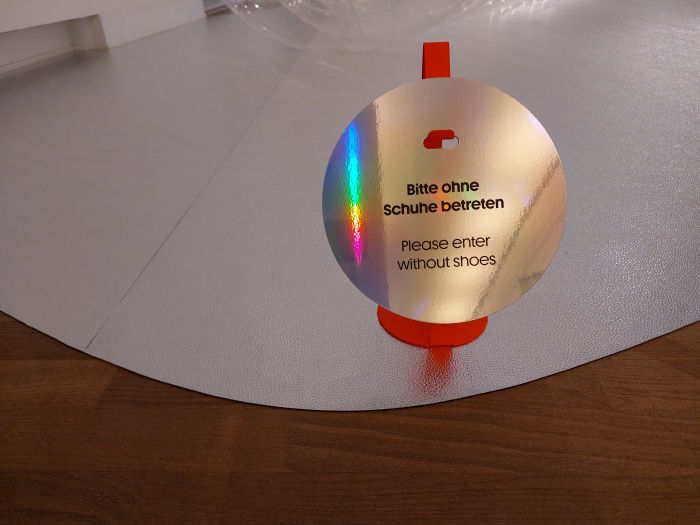Against the background of an ongoing climate emergency, rising nationalism, ever more politically active religious fanaticism of all hues, a Covid pandemic that refuses to go quietly, the return of War to Europe, amongst a great many other contemporary existential ills, there are a myriad questions we'd all rather be asked than if you believe in the future?
We'd all like to believe, but, well.......hhhmmm....... you know.......
The Museum für Kunst und Gewerbe Hamburg however considered the question particularly apposite, necessary even.
And so asked.
And ask.
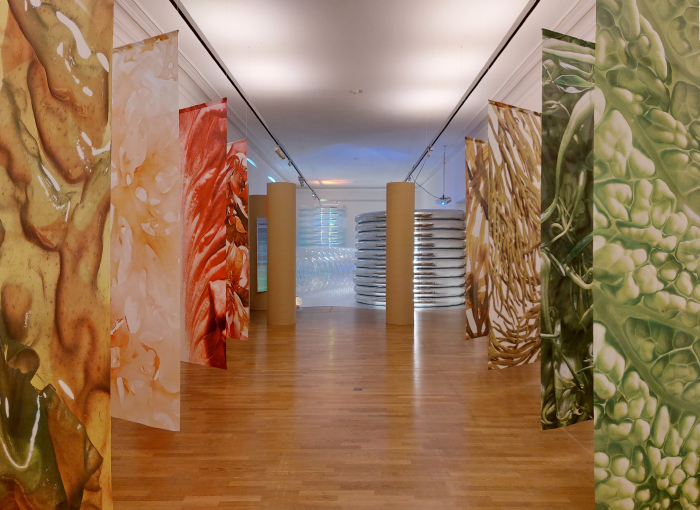
Considerations on the future aren't new, arguably as long as human societies have accepted that the setting sun will definitely rise again, civilisations have considered, to varying degrees, the future. Such were, are, however considerations on the future generally framed in terms of how one imagines the future, where will we be in the future, describe the future.
The question formulated by the Museum für Kunst und Gewerbe, MKG, Hamburg in conjunction with Milan based curator Maria Cristina Didero isn't about the future, they ask if you believe in the future.
Not believe as in do you believe in fairies, or do you believe the sun will rise again, but the ¿do you believe in me? of a young child, do you believe in, have trust in, have confidence in, the future? Do you have faith in the future? For the future will come, but will we want it to, will it be a future whose presence we will rejoice and regale in, or one we would rather had stayed away?
Do you believe in the future?
A question the MKG Hamburg and Maria Cristina Didero posed to four international creative studios.
Four studios who ¡¡¡ SPOILER ALERT !!! all believe in the future, but whose belief is, if one so will, conditional. And whose positions, as presented in Ask Me if I Believe in the Future, discuss four differing aspects of the now as a component of the future in four different formats which introduce four different challenges as we move towards the future, four different premises for a future in which to believe.......
Amongst the four projects the one which references most directly the Covid pandemic in the midst of which the MKG Hamburg and Maria Cristina Didero posed their question, that moment when not only the future looked a long way away, but the present didn't appear to be moving towards it, is Teahouses for Domesticity by New York based Objects of Common Interest, a.k.a Greek born architects Eleni Petaloti and Leonidas Trampoukis; a presentation of three teapots, of three immersive, inflatable plastic proxy teapots, three inflatable interventions in space, three spatial interventions, which reflect in three different ways on the disruption to personal relationships conditioned by the Covid lockdowns and social distancing regulations: a long tube within which two people can approach each other, until in the middle they discover a transparent partition that keeps them separated; a space in which you can sit and watch a real-time film of people outside your enclosed space, albeit a film from a thermal imagining camera, thus only a vague impression of people, a cold impersonal representation of warm, tactile individuals; and a space whose memory foam floor and light refracting interior takes you away from the MKG Hamburg and into an enforced inner reflection, a solitary introspection. Solitary introspection, virtual representation, enforced separation. Isolation........
.......but also three interventions in, disruptions of, our personal relationships which highlight and allow for, in our interpretation of the project, differentiated reflection on the role and function of contact and communication with others and with ourselves, three interventions which allow for differentiated reflection on the importance of both contact, externally and internally, and communication, externally and internally, for us and our societies. That that which we all experienced in the depths of the Covid pandemic in terms of the restricted possibilities for and means of our personal relationships, may not have been good, wasn't good, but going forward those experiences, our responses to them, our attempts to maintain contact and communication despite the many obstacles, can teach us all valuable lessons about human nature, human society, human needs and the place of contact and communication in such.

For all its, understandable, domination of the headlines in recent years, SARS-CoV-2 isn't and wasn't the sole oppressor of optimism in the coming future to afflict global societies, was but one, and among the many others the question of how as a global community we can continue to feed ourselves has become increasingly harder to answer, and ever more acute, not least in context of an ever growing global population and an ever more irreversible climate change. While the War in Ukraine and the consequences thereof in terms of, for example, grain supply, has underlined that the global nature of contemporary food industries, in a fragile geopolitical world, adds to the many complexities in terms of ensuring local food security.
With the project Future-Proof Plating Zürich based, Maastricht born, designer Carolien Niebling argues, in our interpretation of the project, that resolving questions of future food supply necessitates a re-focussing: a re-focussing on how we produce our food, on how we source and supply our food, on what we understand as food, of our relationship with food. A re-focussing undertaken metaphorically in Ask Me if I Believe in the Future via a presentation of large format, close-up photos of algae and edible leaves and by a series of ceramic plates embossed with impressions of algae and edible leaves: the former allowing one to approach questions of how well do we actually know, understand, comprehend our food, where it comes from, how it gets to us, what's it composed of? While the later, and with a touch of almost Art Nouveau-esque linking of object and nature, literally plates up algae and edible leaves in an attractive, aesthetic, appealing manner. A visually appetising presentation which enables, forces, one to consider how tasty and desirable a diet of, ¿self-sufficiently home farmed? algae could be. And how appetising and plentiful and nourishing could food be if we treated it less as a commodity, and more as the basis of human life? All human life.
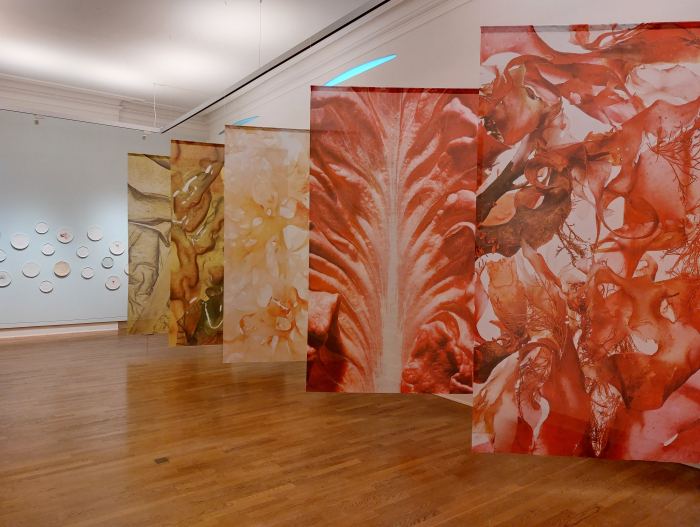
Analogous to questions of the production, supply, consumption of food are questions of our objects of daily use, objects which we don't want to have to do without in the future, but which we all know need to be produced, distributed and consumed in much more sustainable manners than they currently are, much more environmentally, socially, economically sustainable manners than they currently are. But which we currently don't do.
Why Not? ask Venezia based studio Zaven a.k.a designers Enrica Cavarzan and Marco Zavagno.
A simple enough question, certainly a very valid contemporary question, and one Zaven answer via a collection of objects which, in our interpretation of the project, move the emphasis from global industrial production to low-cost, low-tech, local production, again in many regards an Art Nouveau-esque repositioning of the methods of supplying objects of daily use; and for all a collection of objects that we can all make ourselves from readily sourceable, easily workable, materials.
Why Not?
And while the focus of Why Not? is the how not the what, we were very taken by Zaven's wooden side chair, Glueless, a work crafted from wooden blocks joined by an ingeniously simple strategy, a glueless strategy, which enables a wooden chair which although featuring a natural, inherent, flexibility most conducive to advancing ergonomic sitting, maintains its stability. A technical object based on analogue principles that all can understand and directly relate to. And a chair whose function isn't just what it does, but also how it is constructed and wherefore it was developed. A re-imagining of the functionality of a chair. A re-imagining of our relationship with a chair. Re-imaginings of functionality and relationships also undertaken by Zaven in context of clothing, lighting and crockery and which not only pose the question why not, but what are the alternatives?
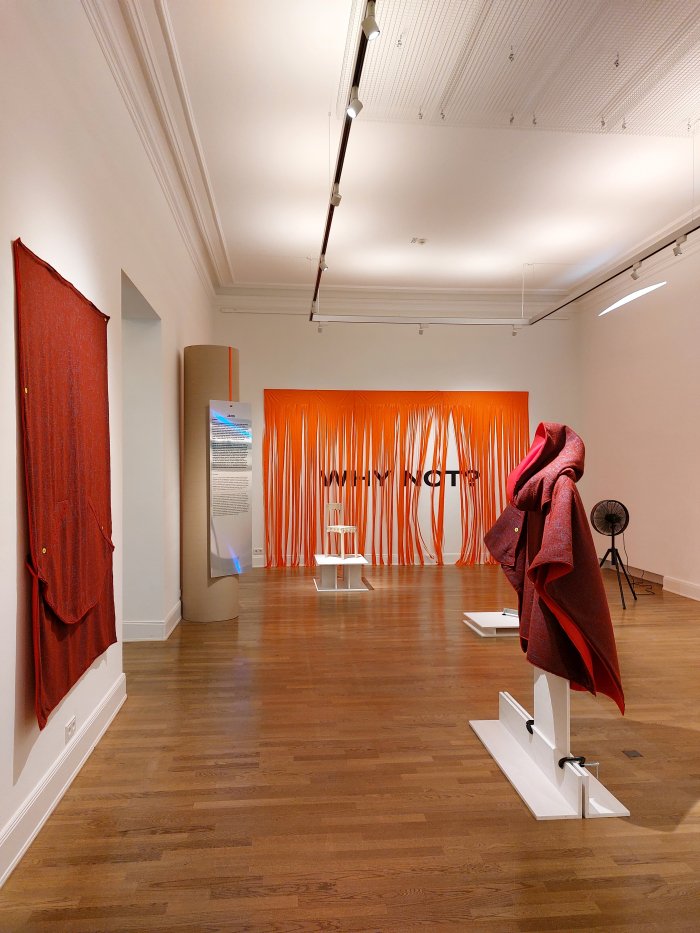
The worse the situation on earth gets the louder the thoughts that we could, should, maybe try our luck elsewhere; which again isn't a new thought, as, for example, the exhibition Back to Future at the Museum für Kommunikation, Frankfurt, elucidated, throughout (hi)story we've often considered settling on other planets. A tradition continued by Tel Aviv based designer Erez Nevi Pana; whereby his settling on other planets is less an escape from earth, and more an expansion of the dominion in which humans exist, a proposition that we spend time on other planets but always return to earth, that, if one so will, we become citizens of the cosmos, not just one small spot on it, without ever giving up (on) our own small spot.
A proposition which naturally requires a little more discipline than that which human societies have demonstrated in the past when moving outwith their existing boundaries. Requires reeling in the human ego. As a species humans have never travelled that well.
Erez Nevi Pana's belief, faith, that we can become better travellers, that we can inhabit the universe without destroying it, being closely tied up with Neil Armstrong's experience of looking at earth from the moon and feeling very, very small, if one so will, and in our interpretation, that when confronted with one's own irrelevance through witnessing, understanding, the bigger picture one is humbled, one's selfishness dissolves, one can no longer distinguish one's self from others, and thereby a respect for others is engendered. A respect that will allow us to peacefully inhabit other planets.
And if we can engender that respect, engender more respect for others, there is, in a more general sense, the promise of a future you can believe in.
¿If we can engender that respect, if we can resolve the problems of and problems caused by the provision of food and our objects of daily use and if we can grasp the importance of, and meaningfully practice, internal and external communication, there is the promise of a future you can believe in?
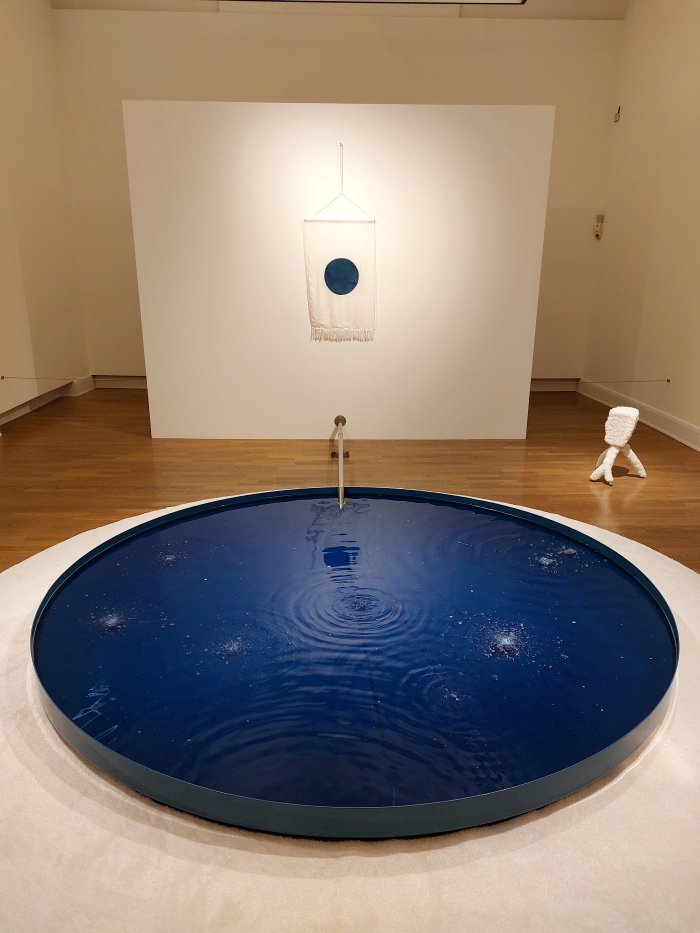
Possibly.
Ask Me if I Believe in the Future presents the reasons Objects of Common Interest, Carolien Niebling, Zaven and Erez Nevi Pana can answer that question in the affirmative. Presents arguments by Objects of Common Interest, Carolien Niebling, Zaven and Erez Nevi Pana for believing in the future.
But do you believe in the future?
A question Ask Me if I Believe in the Future not only poses to each and every visitor but allows each and every visitor to better approach through encouraging a questioning of the belief the four studios have in the future, through a questioning of the foundations of that belief, through a questioning of the positions the four studios take on the present in relation to the future, through a questioning of the validity of that which is on show, the plausibility of the arguments. Through reflections on a Luigi Colani's demand for a "renaissance of Art Nouveau".
A questioning aided and abetted by a film from Francesca Molteni, a film produced in place of a catalogue, a film on constant loop in Ask Me if I Believe in the Future, and a film which accompanies the four studios in the development of their projects, their positions, and thereby offers alternative insights into the thinking of the creatives, and the reasons for their belief in the future.
A questioning each visitor is very much left to undertake on their own, each visitor being very much left to find their own way through the discussions. Rightly so: the question is not only posed individually, but can only be answered individually. Should only be answered individually.
And a questioning that goes beyond that on display. While the four projects reflect on four very specific subjects, the nature of the discussions they initiate are readily extendible, literally and metaphorically, to further subjects. And, yes, we did extend them to autonomous cars, and yes, we do still find it impossible to have any belief in a future where urban transport is centred around cars. Or where delivery drones and flying taxis are, to paraphrase Konstantin Grcic, New Normals in our towns and cities. Nor do we have much belief that communication with others won't remain, and become increasingly so, shouting at each other on social media rather than actually talking, and that communication with ourselves won't primarily be through filtered profiles with idealised avatars and via apps to optimise our self, our selves, rather than listening. As a species we're not that good at learning, because we believe we know.
But that's just us.
And you did ask.
And we're glad you did.
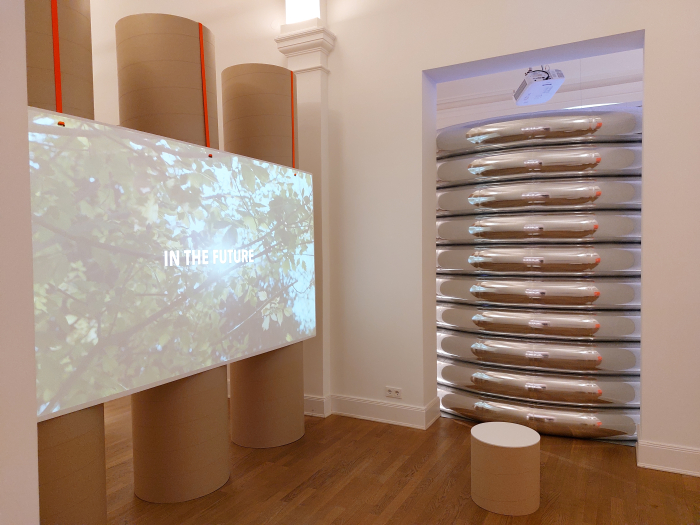
Framed in an exhibition design by Prague based collective Okolo, we don't know if it was by accident or design, nor are we certain by which we would prefer it to have been, but Ask Me if I Believe in the Future's constellation of four projects with four different foci discussed via four different formats is most pleasing, allowing as it does not only for a satisfyingly varied presentation, but a very nice framework in which to move; the constant changes in both subject and conceptual approach intertwine and fuse thereby allowing, forcing, different impulses and enabling your thoughts to wander in ever new directions. A viewing experience which supports very nicely one of the common themes of the four projects, the need to continually approach life, and society, from ever new perspectives and the very real dangers of falling into habits, of developing unquestioned conventions, of just drifting because its easier. An appreciation that because the future will be like the past but different, we need to approach it in ways that are different to those via which we approached it in the past. For we've always been approaching the future. And always will be. (Hopefully.)
An appreciation that allows Ask Me if I Believe in the Future to help elucidate that the future doesn't just happen, it's not governed by laws of physics and guided by unseen forces, doesn't just turn up every morning afresh, but that it depends on us, that we all actively shape the future. That we all are the designers of the future. Individually and collectively. And as a exhibition Ask Me if I Believe in the Future is one in which cooperation and exchange and participation are ever present. None of the four studios' futures can work without cooperation, exchange and participation, none of the four studios' belief can be justified without cooperation, exchange and participation; they may all explore different aspects of humanity and human existence, but cooperation, exchange and participation run through them in equal measure. An omnipresence that tends, certainly tends for us, to an appreciation that cooperation, exchange and participation are key tools in our shaping, our forming, our defining of our future: tools crafted in the dialogue between a belief in the future and a lack of belief in the future, crafted from open, honest, non-hierarchical discussions on our individual belief, or lack of belief, in the future.
And thus an appreciation that the MKG Hamburg and Maria Cristina Didero were right to ask, an appreciation that rather than fearing questions of the future, we should, must, embrace them, demand them, that we must demand of others "Ask Me if I Believe in the Future?" for if we don't things ain't going to get any better.......
Ask Me if I Believe in the Future is scheduled to run at the Museum für Kunst und Gewerbe Hamburg, Steintorplatz, 20099 Hamburg until Sunday October 23rd.
Full information, including information on opening times, ticket prices, current hygiene rules, and details of the accompanying fringe programme can be found at www.mkg-hamburg.de/ask-me-if-i-believe-the-future
